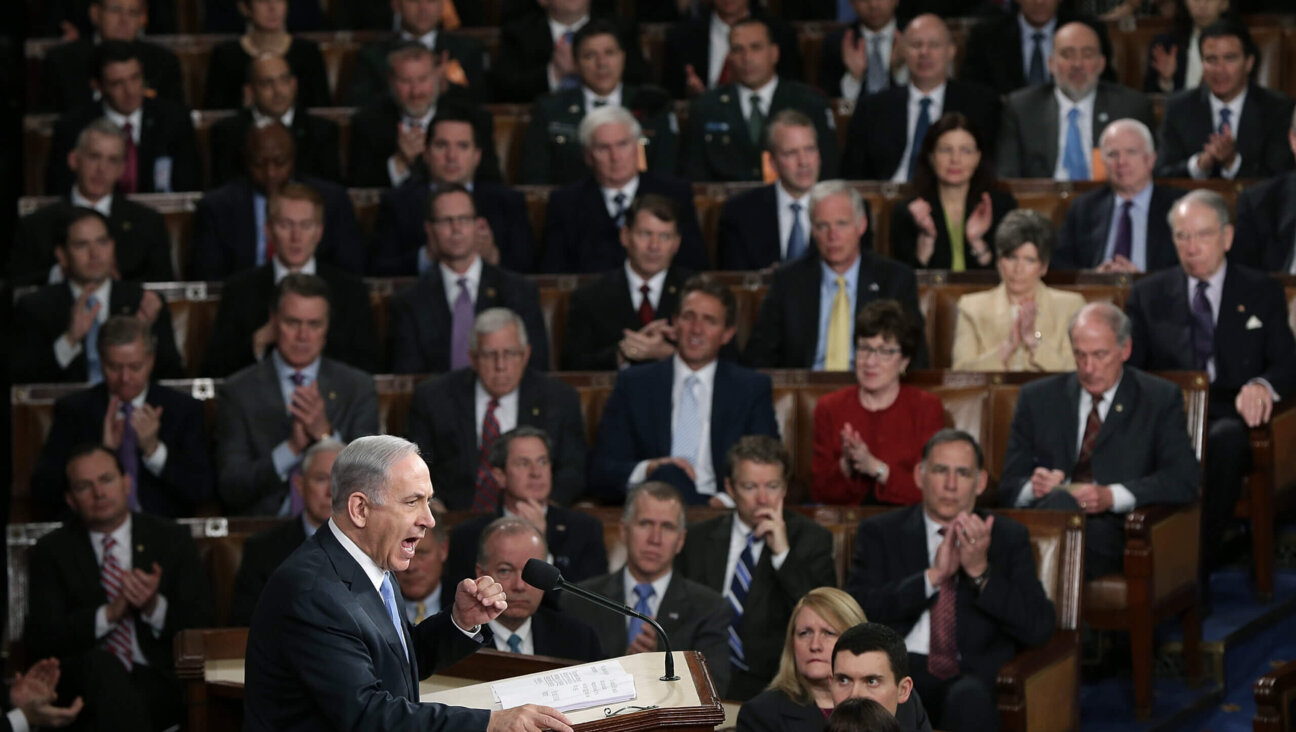British Jewry Turns 350 (Or So Goes the Myth)
The British Jewish community is celebrating its 350th anniversary this year, just a year after America’s Jews observed three-and-a-half centuries in the country. This month a special service will be held at Britain’s oldest synagogue. In September, London’s Trafalgar Square will host a festival devoted to Jewish history and culture. The calendar is full of anniversary-related lectures, concerts and official dinners.
It seems a remarkable coincidence that the Jewish communities of Britain and America were founded at almost exactly the same time. American Jews place the founding of the community in 1654, when 23 Jews, fleeing the Brazilian city of Recife from Portuguese conquerors, found refuge in New Amsterdam — present-day New York. British Jews, for their part, look to 1656, when Oliver Cromwell readmitted the Jews to England, three-and-a-half centuries after the Jews were expelled during the antisemitic Medieval period by King Edward I.
A remarkable coincidence, indeed — were it not for the inconvenient fact that Cromwell did not readmit the Jews to England.
In 1655, a leading rabbi from the thriving Jewish community of Amsterdam called Menasseh ben Israel visited England in order to persuade Cromwell to let the Jews back in. Menasseh cited the familiar mercantile arguments, and also appealed to an eccentric millenarian prophecy circulating at the time that claimed that Christ’s second coming would be preceded by a return of the Jews to England.
Cromwell called together a conference of merchants, lawyers and clergymen to discuss Menasseh’s proposal. But after many days of heated debate, they were unable to reach a verdict, and Menasseh went away empty handed.
Jewish historians have long argued that, although Menasseh’s mission failed, a Jewish community was nevertheless established during 1656. In March of that year, members of the existing Jewish community in London — there were indeed Jews in England prior to Menasseh’s arrival — petitioned Cromwell to allow them to hold synagogue services and to establish a cemetery. The petition for these two hallmarks of communal status, however, was ignored.
The date of 1656, then, is rather arbitrary. Other milestones could have conceivably been chosen as the founding moment of British Jewry. In 1701, the community’s first synagogue, Bevis Marks, was established. In 1753, the so-called “Jew Bill,” which allowed members of the community to become naturalized citizens, was passed by Parliament, though it was repealed a year later. And in 1858 the Jewish emancipation movement resulted in the right to serve in Parliament.
It was not until the late 19th century, when hordes of Eastern European Jews flooded into Britain, threatening the status of the established Jewish community, that Cromwell’s alleged re-admittance of the Jews to England became accepted as the community’s founding story. At the time, the reputation of Cromwell was enjoying a revival, and the first “Resettlement Day” was held in 1894.
In America the story was much the same. The first time the year 1654 was celebrated as the founding of the community was in 1905 — during the great, unsettling waves of mass immigration from Europe. For the Jewish communities on both sides of the pond, the foundational events of the 17th century provided positive precedents for immigration.
It was insecurity from which the need for celebration emerged. So why, at a time of unprecedented communal comfort and safety, are the anniversaries now such a big deal?
Why don’t we recognize that the British readmission story is a myth, and that the founding of the American Jewish community was a small, reluctant affair? And since there were Jews in England and America prior to 1656 and 1654, why can we not admit that there was no “man on the moon” moment?
Jewish leaders in Britain and the United States are quick to point out that the anniversaries are as much about celebrating the Jews’ achievements as about commemorating a historic event. This imperative appears particularly pressing in the light of assimilation-driven fears about continuity.
Whether or not this anxiety is justified, it is driving the movement, on both sides of the Atlantic, to consolidate and institutionalize the celebration of Jewish communal life. While there is nothing inherently damaging about this, it does not exactly advance the vibrant Jewish tradition of questioning history and encouraging critical debate.
Furthermore, it is worth noting that it is not only the Jewish community that stands to benefit from the anniversaries. In Britain, the events this year provide the wider national establishment with an opportunity to congratulate itself on a unique tradition of tolerance. In contrast to other parts of Europe, where antisemitic persecution has been rife, Britain believes that it has upheld the principle of religious liberty since the 17th century.
This tradition of great British tolerance, however, has been overstated. In America, the separation of church and state enshrined in the Constitution has given Jews, on the whole, a proper place in the nation’s structure. But in Britain, church and state remain intertwined — meaning that the inclusion of religious minorities, including Jews, has always been an informal, intermittent affair.
With immigration once again becoming a fraught issue in Britian, tolerance is being trumpeted by political leaders as never before. At the first “citizenship ceremony” for new immigrants, held in 2004, former minister David Blunkett emphasized that “Britain has a great tradition as a tolerant and welcoming nation.”
The formula is repeated whenever there is an attempt to define “Britishness,” and the anniversary celebrations only add to this patriotic self-image. In Britain, it seems fair to say, the Jewish community appears to be continuing the rather old-fashioned tradition of thanking our hosts for having us.
Eliane Glaser, a producer at BBC, is author of a forthcoming history of the Jews in England (Palgrave Macmillan).
A message from our editor-in-chief Jodi Rudoren

We're building on 127 years of independent journalism to help you develop deeper connections to what it means to be Jewish today.
With so much at stake for the Jewish people right now — war, rising antisemitism, a high-stakes U.S. presidential election — American Jews depend on the Forward's perspective, integrity and courage.
— Jodi Rudoren, Editor-in-Chief























